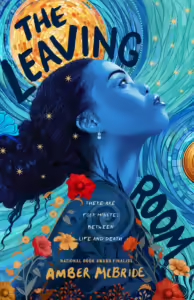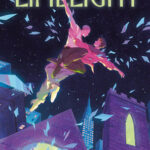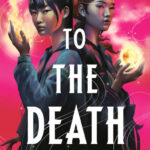
Author Interview: The Leaving Room by Amber McBride
Amber McBride’s writing has always lingered at the edges of the mystical and the deeply human, and The Leaving Room is no exception. In this novel, we meet Gospel, the Keeper of a liminal space where the young must pause between life and death, surrounded by shelves of tiny jars holding the memories of those who have gone. It’s a setting that feels both haunting and tender, an in-between place where grief and love meet, where endings blur into beginnings.
In our conversation, Amber reflects on the childhood memory she would preserve in a jar, the way love and grief inevitably intertwine, and the challenge of writing a romance in a space designed for goodbyes. What unfolds is an exploration not just of storycraft, but of how memory, loss, and connection shape the most fragile (and most courageous) parts of being human. Check it out below and pick up The Leaving Room, out now! Oh, and Amber is a finalist for the National Book Award for Young People’s Literature!

The Leaving Room
Published by: Feiwel and Friendson October 14, 2025
Genres: Fantasy
Bookshop
Goodreads
Gospel is the Keeper of the Leaving Room—a place all young people must phase through when they die. The young are never ready to leave; they need a moment to remember and a Keeper to help their wispy souls along.
Gospel assumes that there are countless other Leaving Rooms because many children pass, but she suspects they are not like her Leaving Room which is small (like a walk in closet)with shelves full of tiny jars that hold the memories of those who have gone.
When a random door opens and a Keeper named Melody arrives, their souls become entangled. Gospel seriousness melts and Melody’s fear of connection fades, but still—are Keepers allowed to fall in love? Now they must find a way out of the Leaving Room and be unafraid of their love. They must claw their way back to their bodies because there is so much more life to explore—together.
Interview with Amber McBride
The jars of memories in Gospel’s Leaving Room sound so vivid and haunting. If you could place one memory of your own on those shelves, what would it be?
This is such a wonderful question. There are so many brilliant moments! I just went on a walk to really think about the exact memory I should pick. It has to be something from childhood; the nostalgia of memories before life was so complicated have a certain glimmer to them.
When I was a kid, I spent summers in the country with my grandma who lives in central Virginia. When I say country I mean no cell signal, no internet and lots of grass, trees and bugs. I was a whimsical child and my grandma always indulged me. Whenever it rained my grandma let me run outside barefoot with the dogs to dance and scream. I remember how refreshing the cool rain felt on my skin especially on humid Virginia summer days. I remember the smell; fresh and earthy. To this day, when I feel overwhelmed that’s what I think about. Being 10 years old, hair in tight braids, dogs jumping around me, barefoot in the mud—joy.
That’s also what my upcoming picture book Magick Hoodoo Child is about. Summers at grandma’s house!
The Leaving Room asks big questions about what it means to pause between life and death, to choose connection even in liminal spaces. How did writing this story shape the way you think about love and grief coexisting?
To me, love and grief are just opposite sides of the same coin—I don’t think one exists without the other. Grief is often described as excess love with no place to go. I remember Toni Morrison said, it is sheer good fortune to miss someone long before they leave you. Morrison is describing the grief of knowing someone might leave. So, the question in this book becomes, can you fall in love in a nowhere place when you don’t even know exactly who you are? Can souls just recognize each other.
The Leaving Room was shaped by the complexity of love and grief being in conversation with each other. As delicate soul-filled things, I think it’s remarkable and very brave of us to love (platonically and romantically), even if grief, pain or loss will be at the end.
Gospel and Melody’s love unfolds in a space meant for endings, not beginnings. What drew you to write a romance in that in-between place, and what do you think we discover about ourselves when love shows up where it “shouldn’t” be?
It was the challenge of trying to write a love story in a place that was meant for goodbyes that really drew me to trying to write the story. I say trying because initially I wasn’t sure if I could pull it off and 4 draft into it I became less sure. I can’t remember who said something to the effect of, if you are not working at the edge of your talent you are not challenging yourself enough, but I definitely felt challenged while writing this book.
Also, so often love shows up without an invitation; exactly where it should not be. You know, when you have sworn off relationships or deleted all the dating apps. It’s always so surprising when it arrives. So, I was intrigued with the idea of trying to create that in a room that is in this elsewhere place. Could I make it feel authentic, could I make it feel like the love had stakes?
I think the thing we discover when love (in all it’s forms) shows up where it shouldn’t is that we are all looking for connection. It can be romantic, friendship, it can be saving a dog on an interstate. Love makes us so brave.








